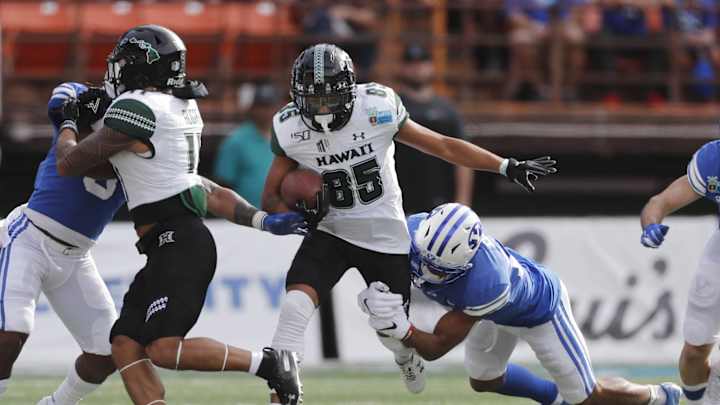Would SI's Hypothetical Conference Realignment Be Good for Cal?

Sports Illustrated's hypothetical realignment of college football conferences leads to one question: Would it be good for Cal?
Pat Forde had the task of creating 10 fictional FBS conferences with 12 teams in each. Teams were grouped primarily by geographic proximity while eliminating the difference between the almighty Power Five conferences and the Group of Five conferences.
The Pac-12 conference drawn up by Forde is not dramatically different from its current setup. It consists of the eight teams from the old Pac-8, including all six teams from the current Pac-12 North, and four new teams from the Mountain West conference: Fresno State, Hawaii, Nevada and San Diego State.
This would create a natural rivalry between Cal and Fresno State, and that matchup would have been particuarly interesting in 2019 because former Cal coach Jeff Tedford was the Bulldogs' head coach.
Cal and Fresno State have faced each other three times, with Cal winning just once. The Sports Illustrated story erred when it said Fresno State had never had a home game against the Golden Bears. In 2000 Fresno State topped Cal 17-3 in a night game in Fresno, a game in which both starting quarterbacks (Cal's Kyle Boller, Fresno State's David Carr) would become first-round NFL draft picks. Boller did not look like a first-rounder that night, though, completing just 44.4 percent of his passes with two interceptions and no touchdowns.
Fresno State also beat Cal 25-24 in Berkeley in 1995, and Cal got its only win over the Bulldogs in 2011, a 36-21 victory in San Francisco. You can see why Cal is reluctant to schedule the Bulldogs.
Cal has done only slightly better against the other three Mountain West teams, so the Bears would not run roughshod over the four interlopers. Cal has a 22-3-1 record against Nevada in a series that began in 1899, but the Wolf Pack has won the last two matchups against the Golden Bears, including 31-24 victory in Berkeley in 2012. Cal is 4-4 against San Diego State and lost its most recent game against the Aztecs in 2016. The Bears own a 3-2 record against Hawaii, whose inclusion in the hypothetial Pac-12 creates two logistial issues -- travel costs and game times.
Hawaii is 2,400 miles from Berkeley, and that is more than twice as far as Cal's most distant current Pac-12 foe (Colorado). It's even a littler farther than the trip Cal made to Chapel Hill, N.C., in 2017.
However, the travel to Hawaii might be offset by the fact that Cal would avoid games against four current teams that are fairly distant -- Colorado (920 air miles from Berkeley), Utah (590 miles), Arizona (750 miles) and Arizona State (650 miles).
Game time is a bigger concern. Games at Hawaii generally start at 6 p.m. local time, which would be 9 p.m. California time and midnight on the East Coast until November. Games would end after midnight in California and after 3 a.m. on the East Coast, so even insomniacs might have trouble watching the closing moments on TV.
Furthermore, the time-zone issue that hurts West Coast schools in terms of national exposure would be even worse for games in Hawaii.
Remember last year when the Pac-12 considered starting some games at 9 a.m. on Saturdays to claim better national exposure? Until November (when Pacific Standard Time kicks in), Hawaii's home games would have to start at 6 a.m. in that setup.
So the bottom-line question again is this: Would the revamped hypothetical Pac-12 be good for Cal?
Yes, for Cal football fans, unless the game is in Hawaii. No, for Cal football
Follow Jake Curtis of Cal Sports Report on Twitter: @jakecurtis53
Find Cal Sports Report on Facebook by searching: @si.calsportsreport
Click the "follow" button in the top right corner to join the conversation on Cal Sports Report on SI. Access and comment on featured stories and start your own conversations and post external links on our community page.

Jake Curtis worked in the San Francisco Chronicle sports department for 27 years, covering virtually every sport, including numerous Final Fours, several college football national championship games, an NBA Finals, world championship boxing matches and a World Cup. He was a Cal beat writer for many of those years, and won awards for his feature stories.